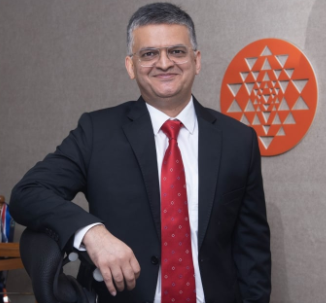The handbook serves as a knowledge product, offering actionable insights and strategies for stakeholders across the housing and finance sectors, promoting gender inclusivity and sustainable housing.


Monu Ratra, ED and CEO, IIFL Home Finance
FinTech BizNews Service
Mumbai, 7 October, 2024: The Asian Development Bank (ADB) and IIFL Home Finance Ltd. (IIFL HFL) have successfully concluded their two-year Technical Assistance (TA) program, resulting in the release of a comprehensive report aimed at fostering green and affordable housing solutions for women in India. Led by women in key leadership roles from both organizations, this initiative focuses on bridging the homeownership gap for women, particularly those from economically weaker sections (EWS) and low-income groups (LIG). The handbook serves as a knowledge product, offering actionable insights and strategies for stakeholders across the housing and finance sectors, promoting gender inclusivity and sustainable housing.
This partnership comes at a critical juncture as India grapples with the challenges posed by rapid urbanization and increasing demand for affordable housing and the green housing practices to curb the carbon footprint in real estate sector. By 2030, nearly 600 million Indians are expected to live in urban areas, making sustainable and inclusive housing solutions more crucial than ever.
The Technical Assistance (TA) program, a joint initiative by IIFL HFL and ADB, aims to enhance Resilient & Green Affordable Housing for the underserved sectors in India. The report, over the last year, with the experts and developers, showcases strategies and best practices for green housing. This comprehensive resource is intended to guide future sustainable housing projects. The research study can be viewed at - https://www.iiflhomeloans.com/adb-iifl-ta-program
The program is structured on three core pillars, Promotion & Propagation which focuses on strategically catalyzing the adoption of sustainable housing practices, ensuring widespread awareness and implementation across the nation. Capacity Building, aiming to enhance the knowledge, skills, and capabilities of stakeholders, empowering them to effectively navigate the complexities of sustainable housing. Research & Innovation component delves into the green building ecosystem, exploring climate adaptation strategies and pioneering innovative solutions that can be scaled across the sector.
The technical assistance study highlights some of the key findings, such as the prioritization of natural ventilation, passive cooling, and green roofs among homeowners in various climatic zones. Despite a growing awareness of sustainable practices, broader implementation remains limited. With over 50% of India’s 2030 building stock still under construction, there is immense potential for sustainable development, especially in tier 2, 3 and 4 cities, which will play a pivotal role in reducing the carbon footprint within infra development.
Mr. Monu Ratra, ED and CEO, IIFL Home Finance Ltd on launch of the Technical Assistance report says “Our partnership with the Asian Development Bank has allowed us to create a pioneering knowledge product that serves as a valuable resource for the green housing sector. The report is more than just a result of our technical assistance; it stands as a testament to our commitment to fostering affordable and sustainable housing solutions. We believe this knowledge product will serve as an essential learning experience and a reference for future projects, helping to set new standards and promote gender inclusivity in homeownership across India. By sharing this knowledge, we aim to empower stakeholders and drive transformative change in the way green housing is developed and implemented nationwide.”
Country Director, India Resident Mission, Ms. Mio Oka said “ADB is extremely pleased to announce the release of this knowledge product which provides valuable insights to enable the ecosystem for improving access to green affordable housing for women in India. Over the past two years, our comprehensive effort to promote, build capacity, and expand research lays a strong foundation for a resilient and inclusive housing ecosystem for developers and policymakers alike. This is a testament to the successful collaboration between ADB and IIFL Home Finance that underscores our commitment to promoting green and affordable housing in India, paving the way for a sustainable future.”
Adding to her Ms. Suzanne Gaboury, Director General of ADB's Private Sector Operations Department says “This handbook is a product of two years of dedicated efforts, research, innovation, and training. The innovations, best practices, and lessons learned in green affordable housing presented in this handbook can serve as a valuable resource to stakeholders, including policymakers, regulators, financial institutions, developers, and architects.”
The research conducted and adapted within the technical report interacted with 776 new homeowners and prospective buyers across suburban areas of tier 1, 2, and 3 cities, reporting a growing dissatisfaction with current accommodations, particularly due to inadequate clean water, poor ventilation, and a lack of eco-friendly amenities.
The research study, conducted across four climatic zones—hot, dry & composite, hot & dry, warm & humid, and composite differently captures varied views—reveals that while 73% of home buyers/owners have only heard about the sustainability and only 27% have in-depth knowledge of the concept. This gap, coupled with high costs and limited availability, remains a significant barrier to adopting sustainable homes. Notably, 50% of respondents expressed dissatisfaction, with those in hot and dry regions being the most affected. Although sustainability is recognized for its benefits, only 6% of prospective buyers are willing to increase their budget for sustainable homes, highlighting cost as a primary concern.
The study emphasizes the need for continued education and incentivization to bridge the knowledge gap and encourage sustainable practices. It also underscores the potential of India’s green building market, expected to reach USD 35-50 billion in coming years, driven by increasing environmental consciousness and government initiatives. However, challenges persist, including poor sanitary conditions, primitive construction, and the high cost of energy-efficient systems.
A key focus in the program elaborates on improving the access to green affordable housing within the length and breadth of the country.
This women-led initiative from IIFL Home Finance and ADB, focuses on building knowledge and resources for affordable and green housing, marks a significant step forward in addressing both the housing and gender disparity in homeownership. The report is intended to be a cornerstone of knowledge, empowering stakeholders to create sustainable, inclusive housing solutions that fulfill the growing needs of India’s urbanizing population.